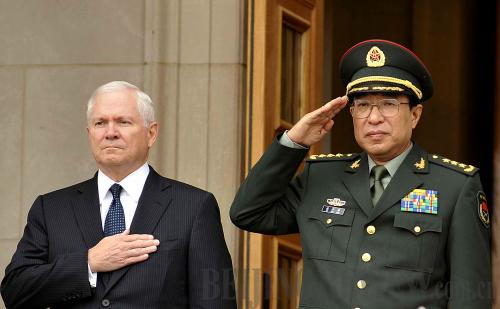|
 |
|
FORWARD-LOOKING: U.S. Defense Secretary Robert Gates welcomes Xu Caihou, Vice Chairman of China's Central Military Commission, at the Pentagon on October 27, 2009 (ZHANG YAN) |
 |
|
(COURTESY OF LIU XUECHENG) |
The Chinese Navy conducted a live ammunition drill in the East China Sea from June 30 to July 5 amid intense speculation by Western media. Held ahead of planned anti-submarine exercises by the United States and South Korea in the Yellow Sea near east China's Shandong Province, the drill was thought to be Beijing's response to the joint war games. But Chinese officials denied this, saying it was a routine training program having nothing to do with Korean Peninsula affairs.
Sino-U.S. relations have gone through dramatic fluctuations since the beginning of this year. Their military ties, of course, are no exception. In January, the Obama administration followed on from the $6.5-billion arms sales package unveiled under the Bush administration and announced the United States would sell sophisticated weapons including Patriot III missiles to Taiwan. The move, which challenged China's core interests, brought the two countries' newly resumed military exchanges to a standstill once again.
From China's perspective, arms sales to Taiwan are one of the main stumbling blocks to the development of Sino-U.S. military relations. And it is the United States, instead of China, that has put up the barrier.
A broken promise
In retrospect, the United States has been responsible for the series of suspensions of Sino-U.S. military exchanges since the end of the Cold War. For instance, the U.S. Government invited pro-"independence" Taiwan leader Lee Teng-hui for a visit despite Beijing's strong opposition in the mid-1990s, giving rise to tensions across the Taiwan Straits. In 1998, U.S.-led NATO forces bombed the Chinese Embassy in Belgrade. Three years later, a U.S. spy plane collided with a Chinese fighter jet while conducting surveillance over China's Exclusive Economic Zone near south China's Hainan Island.
Shortly before leaving office, the Bush administration announced an arms sales package to Taiwan in 2008, resulting in another suspension of Sino-U.S. military exchanges. Exchanges were later resumed when Xu Caihou, Vice Chairman of China's Central Military Commission, visited the United States in October 2009. The two countries' military relations came to a halt once again following Washington's move in January this year. The arms sales are unacceptable—particularly considering the United States and its allies have long banned arms sales to China, including dual-use equipment for both military and civilian purposes.
Ma Xiaotian, Deputy Chief of the General Staff of the People's Liberation Army (PLA), said the United States should take the blame for stagnation in military relations between China and the United States. At the Asia Security Conference in Singapore in early June, he pointed out the United States has put up three obstacles. The first was selling arms to Taiwan of higher quality and greater quantity, posing a direct challenge to China's sovereignty and territorial integrity. The second is intelligence gathering by U.S. warships and aircraft in the South China Sea and the East China Sea. The third is restricting Sino-U.S. military exchanges in 12 areas by legislation.
The United States promised to reduce its arms sales to Taiwan in the Sino-U.S. August 17 Communiqué signed in 1982, three years after the two countries forged diplomatic ties.
In the communiqué, the United States pledged "its arms sales to Taiwan will not exceed, either in qualitative or in quantitative terms, the level of those supplied in recent years since the establishment of diplomatic relations between the United States and China, and that it intends to reduce gradually its sales of arms to Taiwan, leading over a period of time to a final resolution." The United States, however, has ever since failed to honor its pledge.
At a Senate hearing on June 17, Democratic senator Dianne Feinstein called U.S. arms sales to Taiwan "a substantial irritant" in relations between Washington and Beijing, and predicted the issue would remain so in the future. Answering Feinstein's questions, U.S. Defense Secretary Robert Gates said it was up to the Congress and the White House to decide whether to change the way arms are sold to Taiwan. The decision on arms sales to Taiwan is "fundamentally a political decision," he said.
All these examples show the responsibility for creating barriers to military-to-military relations between China and the United States does not rest with China. The Chinese Government has been urging the United States to fulfill its commitments. Its fury and decisions to suspend military exchanges are understandable given the fact the United States attempts to seize the moral high ground while breaking its own promises.
Transparency disputes
Along with progress in China's national defense modernization, the United States has focused increasing attention on China's military power. Its suspicions about the PLA's strategic intentions have also mounted. U.S. officials have complained about China's lacking transparency over military matters on various occasions, while demanding the Chinese Government disclose its military budget, new weapons programs and arms purchases.
| 